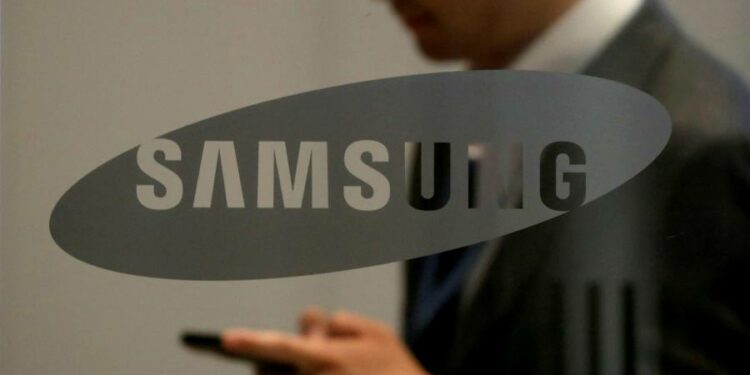Samsung Electronics estimates 52.5% rise in Q4 profits on resurgent chip demand
Samsung Electronics estimated its fourth-quarter profit jumped 52.5 per cent on strong demand for server memory chips and increasing orders for contract chip manufacturing, despite lower chip prices.
Operating profit for the world’s largest producer of computer chips and smartphones was projected at Won13.8tn ($11.5bn) in the quarter ended December, but it was lower than the Won15.2tn forecast by a Refinitiv SmartEstimate. Sales were estimated at Won76tn, up 23.5 per cent from a year earlier.
The South Korean company’s earnings are likely to increase further this year after hitting a low in the first quarter, analysts said, as chip prices are expected to rebound in the second quarter, partly due to reduced production at its plant in Xi’an, China.
Expectations of a chip price recovery have pushed Samsun shares more than 10 per cent higher in the past couple of months as demand for new data centres and streaming services increases with the resurgence of Covid worldwide. Samsung shares rose 1.3 per cent to Won77,900 on Friday morning.
What to watch in Asia today
Hong Kong: A number of public activities will be banned in the territory from today, for at least the next two weeks as Hong Kong prepares for the spread of the Omicron variant.
Data: Japan releases its monthly consumer spending data for November and India releases its annual estimate of its 2022 gross domestic product. The IMF expects the country’s economy to grow 9.5 per cent in the year ending in March.
Earnings: Japanese convenience store operator Lawson and Ryohin Keikaku, the company behind household goods company Muji, both release results today.
GameStop shares jump on report retailer is entering NFT, crypto markets
Video game retailer GameStop, whose shares kicked off the meme-stock trading frenzy last January, is poised to enter the NFT and cryptocurrency game as well.
Gamestop will launch divisions focused on developing a cryptocurrency business and non fungible token marketplace as part of a turnround plan. The move was first reported by the Wall Street Journal.
GameStop shares jumped 22 per cent in after-hours trading to $159.
Gamestop plans to establish cryptocurrency partnerships as well as develop games that use blockchain and NFT technology, WSJ reported.
The retailer’s share price is up more than 600 per cent from a year ago, but down 62 per cent from its high last January. Despite its popularity with retail investors, the company has struggled as the pandemic continues to batter bricks-and-mortar retailers.
US tech shares swing as investors assess Fed minutes and mixed data
Technology shares skidded at the end of a wild trading day on Thursday, in which a mixed bag of economic data coupled with a hawkish tilt from the Federal Reserve clouded the investment outlook for US stocks.
Wall Street’s technology-heavy Nasdaq Composite share index, which dropped 3.3 per cent on Wednesday in its worst session since February, slid 0.1 per cent.
But the small decline belies what had been a volatile trading session, with the index falling as much as 1.2 per cent at one point before rallying as much as 0.7 per cent.
The whipsaw moves followed weak services data, which signalled continued supply-chain disruption, and higher-than-expected initial jobless claims. The data initially prompted a pause in the shift away from high-valuation tech stocks that are seen as the near-term casualty of a resurgent economy and higher Treasury yields.
However the weaker data on Thursday contrasted with numbers on Wednesday showing an increase in private payrolls and higher than forecast manufacturing data. Also on Wednesday, minutes from the latest Fed meeting showed that it may move to raise interest rates and tighten financial conditions more quickly than expected, contributing to the move away from shares in interest-rate sensitive technology companies.
Read more on Thursday’s market moves here.
Argentina’s central bank lifts key rate to 40%
Argentina’s central bank raised its benchmark interest rate for the first time in a year as it seeks to combat high inflation and hash out a new repayment deal with the IMF.
The key Leliq rate will rise to 40 per cent, from 38 per cent previously. Annual inflation in Argentina is running at about 50 per cent.
The bank’s decision to raise rates comes as the leftwing Peronist government faces growing pressure from IMF officials to tighten its monetary policy and present a credible plan to restructure some $40bn owed to the international lender, as part of a record-breaking $57bn bailout in 2018.
In December, fund officials had specifically called for interest rates to exceed inflation.
About $2.8bn that Argentina owes the IMF comes due in late March, which analysts view as a deadline to securing terms for a new repayment programme for the country, which owes $18.8bn this year and then again in 2022.
Martín Guzmán, finance minister and Argentina’s chief IMF negotiator, said this week that the government and the IMF had yet to reach an agreement on how soon to reduce its fiscal deficit following 18 months of inconclusive talks.
Argentine dollar bonds fell the most since September in early trading on Thursday after Guzmán’s speech suggested that a deal in March was not imminent. Credit-default swaps meanwhile widened the most in five weeks.











